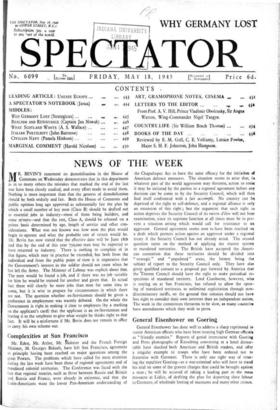NEWS OF THE WEEK
MR. BEVIN'S statement on demobilisation in the House of Commons on Wednesday demonstrates that in this department as in so many others the mistakes that marked the end of the last war have been closely studied, and every effort made to avoid them. Nothing is more important than that the process of demobilisation should be both orderly and fair. Both the House of Commons and public opinion long ago approved as substantially fair the plan by which a small number of key men (Class B) should be drafted out to essential jobs in industry—most of them being builders, and some miners—and that the rest, Class A, should be released on a points basis determined by age, length of service and other con- siderations. What was not known was how soon the plan would begin to operate and what the probable rate of return would be. Mr. Bevin has now stated that the effective date will be June 18th and that by the end of this year 750,000 men may be expected to have returned to industry. There is nothing to complain of in that figure, which may in practice be exceeded, but both from the individual and from the public point of view it is imperative that the Government's interest in the soldier should not cease when he has left the Army. The Minister of Labour was explicit about that. The men would be found a job, and if there was no job suitable for him he would be trained for another and given that. In actual fact there will clearly be more jobs than men for some time to come, but it is wise to prepare for circumstances in which there are not. The question whether ex-Servicemen should be given a preference in employment was warmly debated. On the whole the Government is right in making it clear to employers (by a marking on the applicant's card) that the applicant is an ex-Serviceman and leaving it to the employer to give what weight he thinks right to that fact. It will be a misfortune if Mr. Bevin does not remain in office to carry his own scheme out.


























